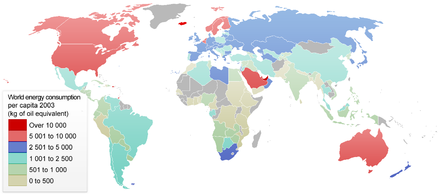
by Bill Schlesinger
Numerous studies link per capita energy consumption to the greater health and well-being of people in various nations worldwide. Question is: does this correlation extend continuously from impoverished nations to well-developed nations, whose primary energy consumption may vary from 25 GJ (gigajoules/person/year) to >400 GJ, respectively. (For reference energy consumption in the U.S. is about 290 GJ/capita/year).
A recent study by Rob Jackson of Stanford University and his collaborators find the answer is no. They used 9 measures of societal well-being and found that these metrics of happiness rise rapidly when energy consumption increases from low levels, but each shows a plateau or threshold, beyond which further energy consumption does not produce a proportion increase in human well-being.
The thresholds vary widely, from 12-15 GJ/capita/yr for access to electricity and sanitation to 125 GJ/year for air quality. Air quality is slow to improve with increasing energy consumption, perhaps because air pollution is so often derived from fossil fuel combustion. Food supply increases linearly with increases in energy use to about 70 GJ/capita/year, beyond which further use of energy offers only marginal gains in supply.
Except for air quality, the metrics of human well-being plateau at about 75 GJ/capita/year. Since global average energy supply is about 79 GJ/capita/year, a large portion of the people of the world are benefitting from greater energy consumption, but they are not likely to be more advantaged with further increases in energy use. Countries such as the U.S., with 290 GJ/capita/year of energy use are likely engaging in much frivolous consumption of energy without benefits to health and happiness. See: The Size of Our Nest – Translational Ecology (duke.edu).
From another viewpoint, it seems likely that in countries with high energy use, consumption of fossil fuels could be reduced considerably and distributed more equally among citizens, without general societal harm. This offers a considerable buffer to reductions in per capita energy consumption to combat global climate change.
Reference
Jackson, R.B., et al. 2022. Human well-being and per capita energy use. Ecosphere doi: 10.1002/ecs2.3978